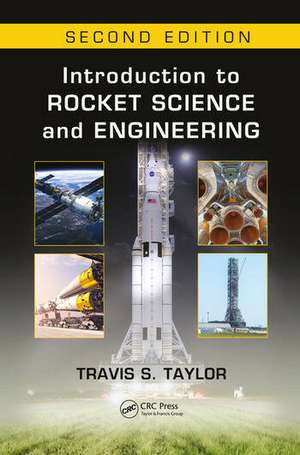Introduction to Rocket Science and Engineering
Autor Travis S. Tayloren Limba Engleză Hardback – 7 iul 2017
Preț: 732.74 lei
Preț vechi: 805.21 lei
-9% Nou
Puncte Express: 1099
Preț estimativ în valută:
140.23€ • 146.09$ • 116.59£
140.23€ • 146.09$ • 116.59£
Carte disponibilă
Livrare economică 18 ianuarie-01 februarie 25
Livrare express 07-11 ianuarie 25 pentru 43.52 lei
Preluare comenzi: 021 569.72.76
Specificații
ISBN-13: 9781498772327
ISBN-10: 1498772323
Pagini: 352
Ilustrații: 265
Dimensiuni: 178 x 254 x 18 mm
Greutate: 0.82 kg
Ediția:Revised
Editura: CRC Press
Colecția CRC Press
ISBN-10: 1498772323
Pagini: 352
Ilustrații: 265
Dimensiuni: 178 x 254 x 18 mm
Greutate: 0.82 kg
Ediția:Revised
Editura: CRC Press
Colecția CRC Press
Cuprins
What Are Rockets? Why Are Rockets Needed? How Do Rockets Work? How Do Rocket Engines Work? Are All Rockets the Same? How Do We Test Rockets? Are We Thinking Like Rocket Scientists and Engineers? Suggested Reading for Rocket Scientists and Engineers. Index.
Recenzii
"This book is an excellent reference for the rocket enthusiast and for anyone interested in participating in any kind of rocket competition. It is a very useful complement to the library of anyone teaching a rocket class."
— Riccardo Bonazza, University of Wisconsin – Madison, USA
— Riccardo Bonazza, University of Wisconsin – Madison, USA
Descriere
Introduction to Rocket Science and Engineering, Second Edition, presents the history and basics of rocket science, and examines design, experimentation, testing, and applications. Exploring how rockets work, the book covers the concepts of thrust, momentum, impulse, and the rocket equation, along with the rocket engine, its components, and the physics involved in the generation of the propulsive force. The text also presents several different types of rocket engines and discusses the testing of rocket components, subsystems, systems, and complete products. The final chapter stresses the importance for rocket scientists and engineers to creatively deal with the complexities of rocketry.
